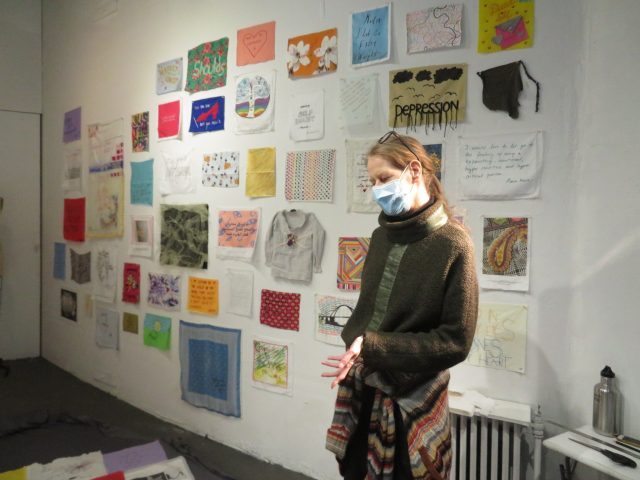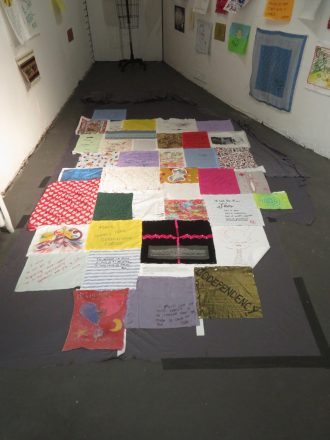
Yana Schnitzler’s Tales of a Phoenix: The Letting Go Project continues through March 29 (photo by twi-ny/mdr)
ChaShaMa gallery space
266 West Thirty-Seventh St. at Eighth Ave.
Monday – Saturday through March 29, free, 1:00-6:00
www.humankinetics.org/participate
chashama.org
tales of a phoenix slideshow
I first saw Yana Schnitzler perform with two members of her Human Kinetics company in a small storefront on Nassau St. in September 2007, the trio moving through a rapt audience crowded on the floor. Fourteen years later, Schnitzler is once again in a small storefront, this time all alone, in a tiny space on West Thirty-Seventh St. in the Garment District near Port Authority, operated by the nonprofit arts organization Chashama, Well, she might be physically by herself, but she is surrounded by the hopes and dreams, fears and anxieties of women from around the world.
Prepandemic, the Berlin-born dancer, choreographer, and installation artist began Tales of a Phoenix: The Letting Go Project by putting out an open call for women to send her pieces of fabric on which they were to write something about themselves. “Like a snake that sheds its skin when it is outgrown, what is it that you’re yearning to shed?” the invitation read. “What old habit, memory, fear, or belief that might be amplified in these challenging times are you ready to let go of because it does not allow growth? What is it that keeps you from building a renewed version of yourself?” Women sent their replies by the hundreds, and beginning February 20 and continuing through March 29, Schnitzler will be working in the Chashama space, stitching the pieces together into a huge skirt, evoking a southern storytelling quilt. She’ll be there Monday to Saturday from 1:00 to 6:00; passersby can watch from the sidewalk or come in and speak with her, as long as they are masked and remain socially distanced. They are also welcome to take a strip of fabric and a pen and share their own personal note. Before being added to the skirt, the fabric contributions and their messages hang on the walls, anonymous works of art that are powerful and emotional; be sure to have tissues at the ready.

Skirt features fabric with deeply personal messages from women around the world (photo by twi-ny/mdr)
“I need to let go of trying to be perfect for others. I need to be perfect for me!” one woman proclaims. “I would like my toxic family to no longer have the power to cause me pain,” another says. “Patriarchy Overdose” is written in black marker over a painting of flowers and smiling, blond Barbie-like figures. The word “Depression” is stitched onto brown fabric under dark clouds, the threads dangling off the letters. The phrase “I’m not __ enough” (pretty, smart, brave, creative, myself . . .) is written over and over again in a circular pattern until, at the very center, it says, “I’m not enough.” Some are extravagantly designed, while others are more simple and basic, but each one communicates a feeling that connects, particularly at a time when misogyny, domestic abuse, sexual harassment, and other forms of violence against women are so prevalent, during a pandemic that has affected single and working mothers disproportionately. In the back is a headless, limbless mannequin dubbed Sally, which can be interpreted as something to keep Schnitzler company or a grim reminder of the status of women in contemporary society.
Schnitzler is a site-specific specialist who has previously brought Human Kinetics to the glassed-in Urban Garden Room in midtown, Brooklyn Bridge Park, the Hudson River pier, the Lower East Side Festival of the Arts, and the fountain outside the Met. “Letting Go” has quickly become part of the community; people pass by and say hello, write on a piece of fabric and slip it under the door, and come inside to chat. When it got very cold, a man who worked in the building across the street lent Schnitzler a better space heater. Once she leaves the storefront, she will take the skirt and the individual pieces of fabric yet to be stitched on the road; the plan was to hold exhibitions in galleries in Detroit, DC, and Bonn, Germany, but Covid-19 still has something to say about that.
Although several of the pieces are difficult to read, filled with so much pain and anguish, the project emits a positive, heartwarming, spirit-lifting energy that is embodied by Schnitzler, who is hopeful for the future of these women and the planet. Tales of a Phoenix developed organically, heading off in unexpected directions that surprised and delighted Schnitzler; it will come to a close next year with the ritualistic public destruction of the skirt, worn by the artist. She’ll be getting rid of the collective fears and anxieties, worries and heartache of the past year-plus in one large, participatory primal release of mass healing, ashes to ashes, dust to dust, from which the phoenix will rise again.